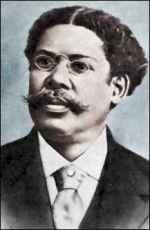In that house, it was the libraries the special place where the politician and journalist used to work late in the nights, and it was among his books where his cherished friends and familiy in an evening of honor.
“The inner library served as burial chamber. The coffin, cornered by four candles, was covered with the Cuban flag,with a crucifix at the front; everyhtin was placed over a The first guard of honor was made by his son Vincent and his sons-in-law Leonardo, Placido and Rafael.
“An emissary of President presented the mourners with an invitation to hold a wake at the Capitol and give him the official honors. His daughters did not accept the invitation knowing that his father was a firm opposer of Machado,” describes Mercedes Ibarra Ibáñez, granddaughter of the patriot, in her text included in the compilation Juan Gualberto Gómez. La Patria escrita, recently published by Ediciones Matanzas.
Eighty-two years after the death of the man who led the coordination of the 1895 restart of the independence war in Cuba under the guidance of Maestro José Martí’s, the writings compiled by journalist Norge Céspedes reflect the human being and revolutionary who was proud of his dark complexion through the criterion of diverse voices from different times.
“Few men have left so a genuine print and yet so simple, worth of telling ” said Jorge Manach; “Who but Juan Gualberto defended with the hardest courage, Marti’s unflagging inspiration, Cuba’s rights against the blow that meant the Platt Amendment?” asked Nicolas Guillen.
Decades of physical absence are not enough to overshadow the impression of a man who has becomes a paradigm love for his country, but it is the turn of the Cubans of today to honor their roots with actions, to continue with unwavering spirit.
And the words of Juan Gualberto to young Maria Antonia Funcasta on February 24, 1933, after raising the Cuban flag hoisted traditionally by the family on important dates, are still valid “Look at it well, for it must be defended with our own blood.”
Translated by: Daysi Olano Fernandez
Revised by ESTI


